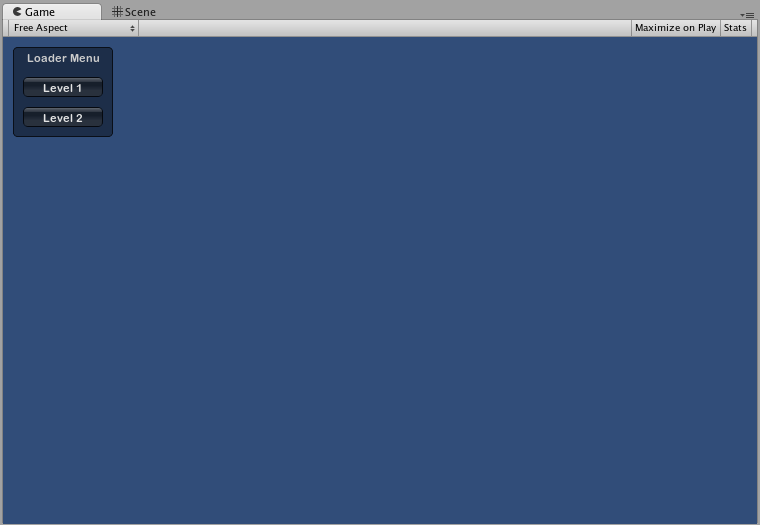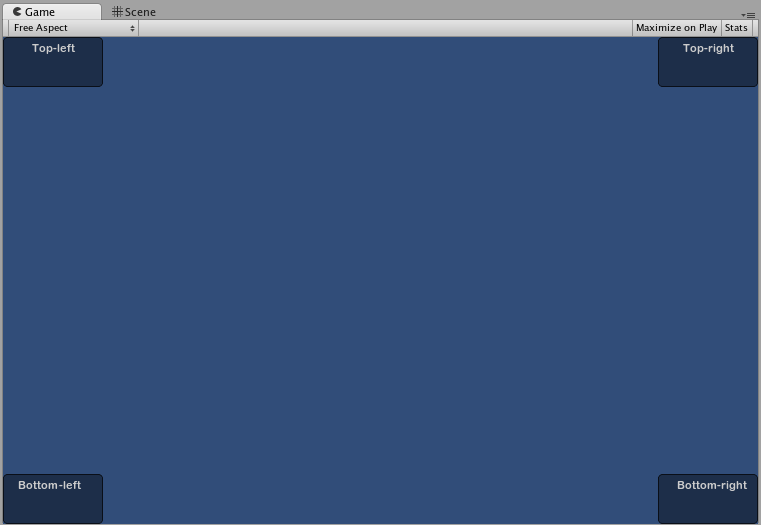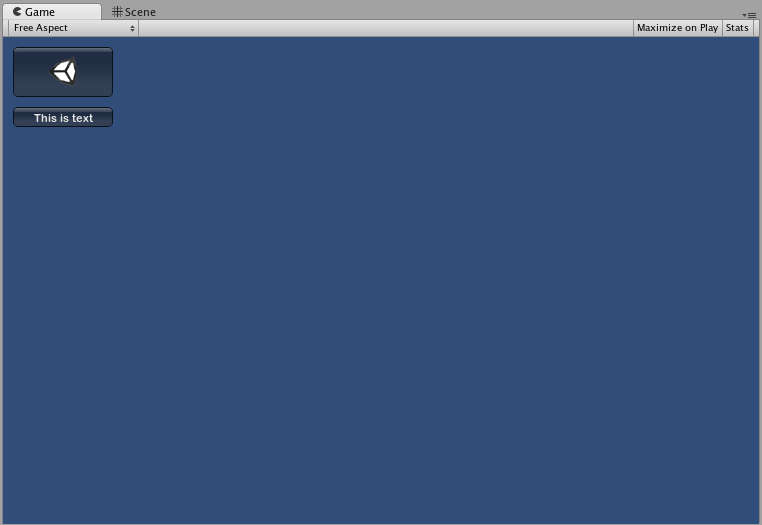IMGUI の基本
このセクションでは、Unity の Immediate Mode GUI システム (IMGUI) をスクリプトで制御する基本について説明します。
IMGUIでのコントロールの作成
IMGUI での制御は、OnGUI() と呼ばれる特殊な関数を使用します。OnGUI() 関数は、Update() 関数同様、含んでいるスクリプトが有効になるたびに呼び出されます。
IMGUI 制御自体の構造は非常にシンプルです。この構造は、次の例で明らかになります。
/* Example level loader */
// JavaScript
function OnGUI () {
// Make a background box
GUI.Box (Rect (10,10,100,90), "Loader Menu");
// Make the first button. If it is pressed, Application.Loadlevel (1) will be executed
if (GUI.Button (Rect (20,40,80,20), "Level 1")) {
Application.LoadLevel (1);
}
// Make the second button.
if (GUI.Button (Rect (20,70,80,20), "Level 2")) {
Application.LoadLevel (2);
}
}
//C#
using UnityEngine;
using System.Collections;
public class GUITest : MonoBehaviour {
void OnGUI () {
// Make a background box
GUI.Box(new Rect(10,10,100,90), "Loader Menu");
// Make the first button. If it is pressed, Application.Loadlevel (1) will be executed
if(GUI.Button(new Rect(20,40,80,20), "Level 1")) {
Application.LoadLevel(1);
}
// Make the second button.
if(GUI.Button(new Rect(20,70,80,20), "Level 2")) {
Application.LoadLevel(2);
}
}
}
この例は、完全な、機能的なレベルローダーです。このスクリプトをコピー&ペーストして、GameObject に追加する場合、Play Mode に入ると、次のメニューが表示されます:

サンプルコードの詳細を見てみましょう。
最初の GUI 行、GUI.Box (Rect (10, 10, 100, 90)、“Loader Menu”); には、ヘッダーテキスト Loader Menu のある Box が表示されます。これから少しの間見ていく通常の GUI コントロールの宣言スキームに従います。
次の GUI 行は、Button コントロールの宣言になります。Box Control の宣言とは若干異なることに注意ください。具体的には、Button 宣言全体が if 文内に置かれます。ゲーム実行中にボタンをクリックすると、この if 文は真を返し、if ブロック内のコードが実行されます。
OnGUI() コードはフレームごとに呼び出されるので、GUI コントロールを明示的に create または destroy する必要はありません。コントロールを宣言する行は、create する行と同じです。特定の時間に Control を表示する必要がある場合、スクリプティングロジックを使用して、行うことができます。
/* Flashing button example */
// JavaScript
function OnGUI () {
if (Time.time % 2 < 1) {
if (GUI.Button (Rect (10,10,200,20), "Meet the flashing button")) {
print ("You clicked me!");
}
}
}
// C#
using UnityEngine;
using System.Collections;
public class GUITest : MonoBehaviour {
void OnGUI () {
if (Time.time % 2 < 1) {
if (GUI.Button (new Rect (10,10,200,20), "Meet the flashing button")) {
print ("You clicked me!");
}
}
}
}
ここで、GUI.Button() は、毎秒呼び出されるだけなので、ボタンは表示されたり、消えたりします。当然、ユーザーはボタンが表示されている時にのみクリックできます。
ご覧のとおり、必要なロジックを使用して、GUI コントロールが表示され、関数となるタイミングを制御します。各コントロールの宣言の詳細を詳しく見てみましょう。
コントロールの分解(Anatomy of a Control)
GUI コントロールの宣言時に必要な、重要な情報は次の 3 つです。
Type (Position、Content)
この構造が 2 つの引数を持つ関数であることを確認します。この構造の詳細を詳しく見てみましょう。
Type
Type は、Control Type で、Unity の GUI class または GUILayout class で関数を呼び出すことで宣言されます。これについては、本ガイドの IMGUI レイアウトモード で詳細に説明します。例えば、GUI.Label() は非インタラクティブなラベルを作成します。各種コントロールのタイプについては、すべて、本ガイドの コントロール で後述します。
Position
Position は、GUI コントロール関数の 1 つ目の引数です。この引数自体は、Rect() によって提供されます。Rect() は次の 4 つのプロパティーを定義します。left-most position 、top-most position 、total width 、total height 。これらの値はすべて integers で提供されます。これらの値はピクセル値に対応しています。UnityGUI コントロールはすべて Screen Space で機能します。これは、パブリッシュされたプレイヤーのピクセル単位の解像度です。
座標系は上-左ベースになります。Rect(10, 20, 300, 100) は、0,20 と、座標 310,120 の端で始まる長方形を定義します。Rect() の値の 2 つ目のペアは、合計の幅と高さであり、コントロールが終了する座標ではありません。このため、前述の例は、300,100 ではなく、310,120 で終了します。
Screen.width と Screen.height プロパティーを使用して、プレイヤーで使用できる画面空間の合計寸法を取得できます。次の例は、これがどのようにして行われるのかを理解する手助けとなります:
/* Screen.width & Screen.height example */
// JavaScript
function OnGUI () {
GUI.Box (Rect (0,0,100,50), "Top-left");
GUI.Box (Rect (Screen.width - 100,0,100,50), "Top-right");
GUI.Box (Rect (0,Screen.height - 50,100,50), "Bottom-left");
GUI.Box (Rect (Screen.width - 100,Screen.height - 50,100,50), "Bottom-right");
}
// C#
using UnityEngine;
using System.Collections;
public class GUITest : MonoBehaviour {
void OnGUI(){
GUI.Box (new Rect (0,0,100,50), "Top-left");
GUI.Box (new Rect (Screen.width - 100,0,100,50), "Top-right");
GUI.Box (new Rect (0,Screen.height - 50,100,50), "Bottom-left");
GUI.Box (new Rect (Screen.width - 100,Screen.height - 50,100,50), "Bottom-right");
}
}

Content
GUI コントロールの 2 つ目の引数は、コントロールで表示される実際の内容です。コントロールでテキストや画像を表示したい場合がほとんどです。テキストを表示するには、次のように Content 引数として文字列を渡します。
/* String Content example */
// JavaScript
function OnGUI () {
GUI.Label (Rect (0,0,100,50), "This is the text string for a Label Control");
}
// C#
using UnityEngine;
using System.Collections;
public class GUITest : MonoBehaviour {
void OnGUI () {
GUI.Label (new Rect (0,0,100,50), "This is the text string for a Label Control");
}
}
画像を表示するには、パブリック変数 Texture2D を宣言し、次のように Content 引数として変数名を渡します:
/* Texture2D Content example */
// JavaScript
var controlTexture : Texture2D;
function OnGUI () {
GUI.Label (Rect (0,0,100,50), controlTexture);
}
// C#
public Texture2D controlTexture;
...
void OnGUI () {
GUI.Label (new Rect (0,0,100,50), controlTexture);
}
以下は、より現実に近いシナリオの例です:
/* Button Content examples */
// JavaScript
var icon : Texture2D;
function OnGUI () {
if (GUI.Button (Rect (10,10, 100, 50), icon)) {
print ("you clicked the icon");
}
if (GUI.Button (Rect (10,70, 100, 20), "This is text")) {
print ("you clicked the text button");
}
}
// C#
using UnityEngine;
using System.Collections;
public class GUITest : MonoBehaviour {
public Texture2D icon;
void OnGUI () {
if (GUI.Button (new Rect (10,10, 100, 50), icon)) {
print ("you clicked the icon");
}
if (GUI.Button (new Rect (10,70, 100, 20), "This is text")) {
print ("you clicked the text button");
}
}
}

3 つめのオプションとして、GUI コントロール内で画像とテキストを一緒に表示する方法があります。GUIContent オブジェクトを Content 引数として渡し、GUIContent 内で表示する文字列と画像を定義できます。
/* Using GUIContent to display an image and a string */
// JavaScript
var icon : Texture2D;
function OnGUI () {
GUI.Box (Rect (10,10,100,50), GUIContent("This is text", icon));
}
// C#
using UnityEngine;
using System.Collections;
public class GUITest : MonoBehaviour {
public Texture2D icon;
void OnGUI () {
GUI.Box (new Rect (10,10,100,50), new GUIContent("This is text", icon));
}
}
GUIContent で Tooltip を定義し、マウスオーバーすると、GUI のどこの場所でもヒント( Tooltip )を表示できます。
/* Using GUIContent to display a tooltip */
// JavaScript
function OnGUI () {
// This line feeds "This is the tooltip" into GUI.tooltip
GUI.Button (Rect (10,10,100,20), GUIContent ("Click me", "This is the tooltip"));
// This line reads and displays the contents of GUI.tooltip
GUI.Label (Rect (10,40,100,20), GUI.tooltip);
}
// C#
using UnityEngine;
using System.Collections;
public class GUITest : MonoBehaviour {
void OnGUI () {
// This line feeds "This is the tooltip" into GUI.tooltip
GUI.Button (new Rect (10,10,100,20), new GUIContent ("Click me", "This is the tooltip"));
// This line reads and displays the contents of GUI.tooltip
GUI.Label (new Rect (10,40,100,20), GUI.tooltip);
}
}
大胆に行くならば、GUIContent を使用して文字列、アイコンおよび Tooltip を表示できます!
/* Using GUIContent to display an image, a string, and a tooltip */
// JavaScript
var icon : Texture2D;
function OnGUI () {
GUI.Button (Rect (10,10,100,20), GUIContent ("Click me", icon, "This is the tooltip"));
GUI.Label (Rect (10,40,100,20), GUI.tooltip);
}
// C#
using UnityEngine;
using System.Collections;
public class GUITest : MonoBehaviour {
public Texture2D icon;
void OnGUI () {
GUI.Button (new Rect (10,10,100,20), new GUIContent ("Click me", icon, "This is the tooltip"));
GUI.Label (new Rect (10,40,100,20), GUI.tooltip);
}
}
GUIContent のコンストラクター のスクリプティングリファレンスページで幅広いサンプルの一覧を参照してください。